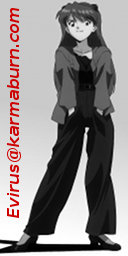|
|
Blog Archives:
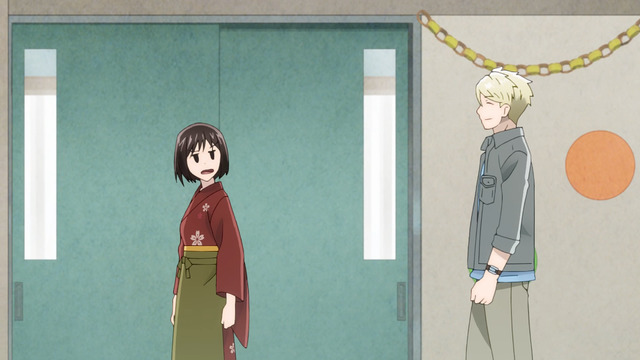
Stalker distancing.
News that the Spring 2021 anime season would feature TWO shows about adult men paired with high school girls created ripples across the Twitter, but even this mild outrage waned after viewers discovered neither show was as torrid as anticipated. Descriptions of Koi to Yobu ni wa Kimochi Warui (It's Disgusting to Call This Love, A.K.A. Koikimo) in particular concentrated on elements that ranged from misleading (characterizing its male lead as "a womanizer") to outright untruthful (e.g., calling him "sex-crazed...with a wandering eye for women"). At the risk of stereotyping too much, I suspect more attention should have been paid to the fact that the Koikimo manga is described as josei (i.e., for adult women) instead of seinen (i.e., for adult men who miss fucking teenage girls).
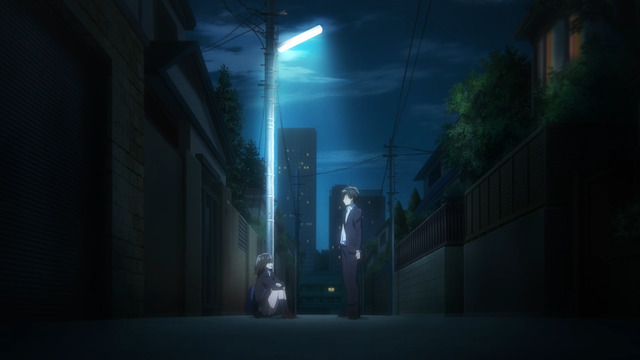
I was too bothered by Sayu's lack of luggage to make a Fate/stay night joke.
Curiously, Hige wo Soru. Soshite Joshikousei wo Hirou. (Higehiro: After Being Rejected, I Shaved and Took in a High School Runaway) seemed to attract less pre-season attention than Koikimo, but perhaps its original novels and manga adaption were already known well enough to deflect unwarranted speculation that it was going to be a smutty romp. This, despite its synopsis outright stating that its characters meet when the titular teenage girl, Sayu, offers sex in exchange for a place to stay. Instead, Higehiro is about a man, Yoshida, who insists he is not attracted to the JK crashing at his place. The series begins with Yoshida being rejected by his long-term crush (his boss at work, no less) who claims she is already seeing someone. He is so devastated that he seemingly does not even notice she was CLEARLY LYING.
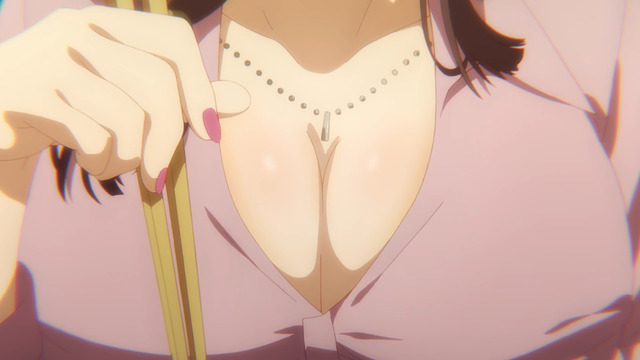
Dude, you're staring.
Higehiro also draws attention to Yoshida's insistence that he is not a "nice guy" for letting Sayu live with him without strings attached (unlike everyone else she has stayed with during her previous six months as a runaway), but rather that the other men she has known are despicable people. Yoshida also repeatedly insists he is not attracted to Sayu because he only likes women with large breasts, but then the show promptly undercuts him by immediately alerting (and repeatedly reminding) the viewer that Sayu's boobs are also comfortably big.
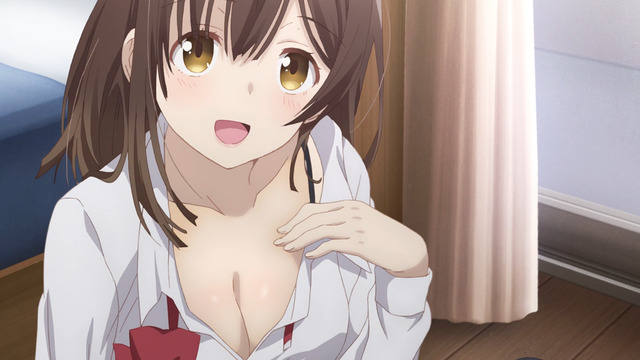
Higehiro even quantifies the comparison.
This is where I lose the ability to predict the path Higehiro will take. There is enough fan service and "male gaze" to the anime that we are obviously supposed to see Sayu as a legitimate love interest of Yoshida's, despite (or perhaps because of) his loud denials. But the show also retains the harem elements by keeping the CLEARLY LYING boss lady and deliberately slapdash co-worker near as potential romantic rivals. If I had to guess how this story ends, I would expect Yoshida's support to put Sayu on a path to success before re-uniting the two after a multi-year timeskip apart that has given Sayu time to become a self-sufficient adult with even bigger boobs than ever. Alternatively, we'll get a cop-out non-ending ending, potentially with all four of them living together for contrived reasons.
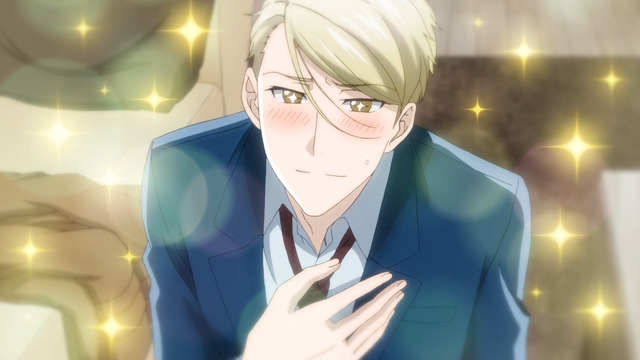
You can tell he's sincere because of the sparkles.
While Higehiro is about a man who denies being attracted to the teenage girl living with him, Koikimo is about a man openly and aggressively wooing a high school girl 10 years his junior. At this point, I think it is necessary to acknowledge the tropes that govern this story's boundaries. Ryo and Ichika meet by chance and a suspension bridge moment sparks his sudden obsession with Ichika, who is coincidentally classmates with Ryo's kid sister, Rio. Fortunately for Ryo, his sister not only approves of his infatuation with her friend, but even volunteers as his wingman to provide opportunities for him to get closer with Ichika.
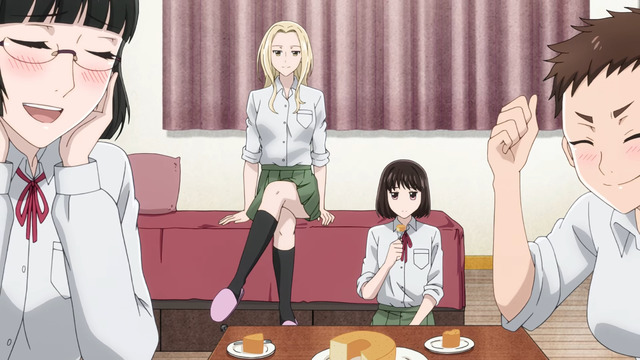
Rio's anime bed is made of concrete.
Moreover, Ichika's own mother approves of Ryo's courtship, despite Ichika's clear displeasure. It is probably worth pointing out that Ryo has apparently never had to pursue a love interest before. He is not a pick-up artist chasing after fresh prey. Instead, girls and women have thrown themselves at him his entire life (Ichika's and Rio's classmates all unanimously agree Ryo is exceptionally handsome), so this is an entirely new experience for him.
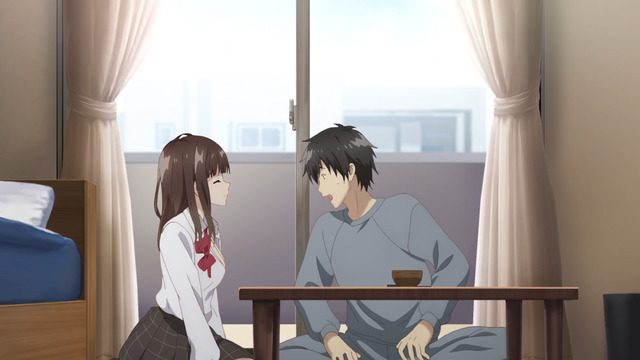
Dude, you're staring.
So what are Koikimo and Higehiro both missing? Lust. In the case of Koikimo, Ryo is clearly, genuinely smitten with Ichika, but he is arguably more drawn to her disinterest in him than he is to her physical appearance. Ichika is presented as being fairly unremarkable among her peers, and her own best friend describes her as "normal" (although at least one boy at her school has taken a liking to her). In the case of Higehiro, it takes three episodes of the show loudly signalling that Sayu is comely and sexually available before Yoshida finally admit he finds her attractive. However, his refusal to sleep with her is predicated on a critical, foundational cornerstone to the narrative's integrity, so I don't expect the story can too easily reverse this stance even if the audience comes to think he protests too much.
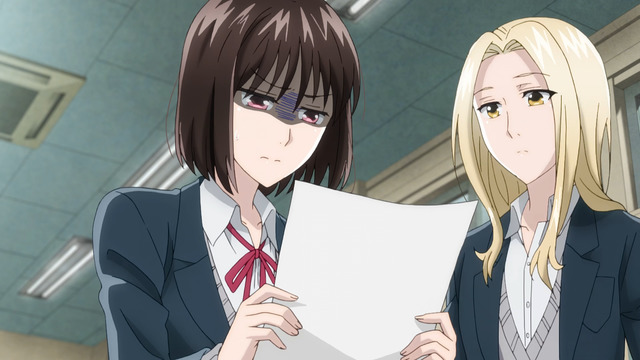
She is upset because she is pleased.
After four episodes of Koi to Yobu ni wa Kimochi Warui and three episodes of Hige wo Soru. Soshite Joshikousei wo Hirou., I enjoy Koikimo more than Higehiro. Neither series is especially realistic (although I could believe Higehiro, despite the melodrama, were it not for the CLEARLY LYING Christmas-cake boss lady and the co-worker who deliberately fucks up her work for Yoshida's attention), but I find Koikimo more amusing. I can't rule out the possibility that I'm simply more enamored of Ichika's seemingly endless barrage of disgusted faces than I am with Sayu's "pretty big for a high school girl" bosom, though.
Posted in Hige wo Soru. Soshite Joshikousei wo Hirou., Koi to Yobu ni wa Kimochi Warui | Tags: 16-year-old love interests, Bend Her Over a Kotatsu, Built for Sin, Christmas Cake, Compare and Contrast, Harem Comedy, Light Novels, Love Confessions, Love Triangle, Manga, May-December Romances, Plying Girls, Rape, Romance, Season Introduction, Sex, Spring 2021, tsundere, Twitter, Unrequited Love | Permanent Link
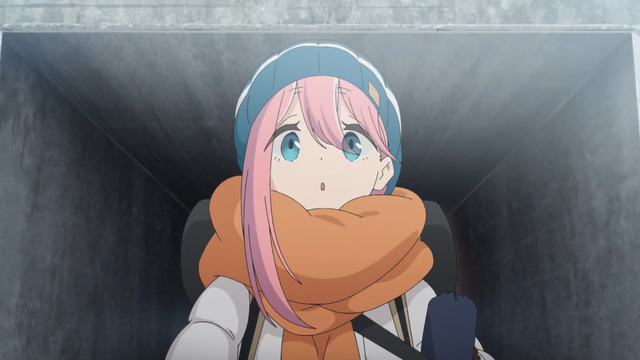
I appreciate Nadeshiko's apparent immunity to fatigue.
Surprising no one who watched the first season, Yuru Camp△ SEASON 2 remains fantastic. I don't actually watch a lot of shows that I would expect to be similar in terms of tone and content, such as Yama no Susume (Encouragement of Climb), or Non Non Biyori, but perhaps I should, considering how much I enjoy Yuru Camp△. Then again, the majority of my interest in the show unmistakably centers around Rin specifically, and her various camping-related efforts. I mean, I like all the other characters too, but significantly less so, and I'm fairly sure this perspective is nearly universal among fans of the show.
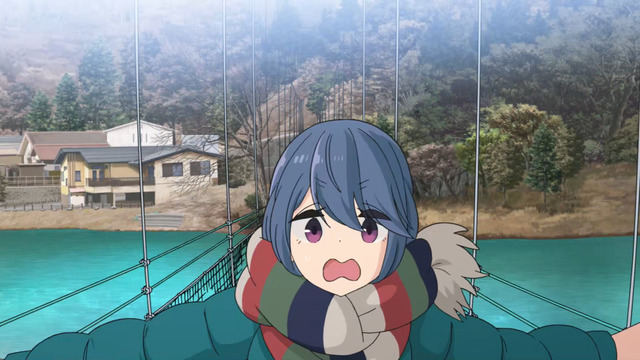
So what happens if you do the suspension bridge thing alone?
Actually, there is one other character I know some Yuru Camp△ fans seem to like a lot: Nadeshiko's older sister, Sakura. For years now, Yuru Camp△ fan art has featured a lot of Rin x Sakura 'shipping. (Admittedly, it is one prolific artist who dominates this scene.) I found this pairing a little peculiar, since the two characters interacted basically not at all in the first season. Best I could figure, it was either in reference to something that developed later on in the source material, or ardent fans fabricated it whole cloth.
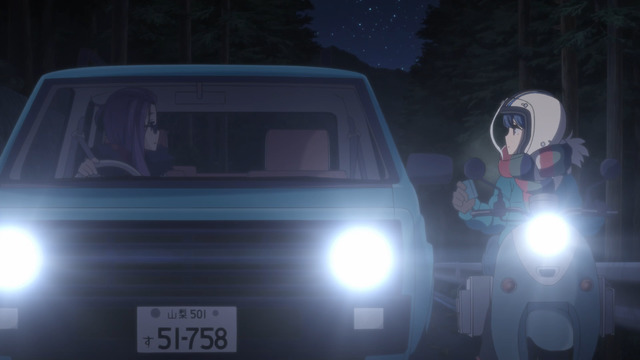
You know, people would have lost their minds if Sakura
had been Nadeshiko's older brother instead.
Presuming the anime is adapting the original manga (as opposed to inventing stories to bolster the anime-tourism economy), it seems we've at least reached the genesis of this particular movement. I don't actually expect Yuru Camp△ to expand this meeting into a genuine romance, though. Fan enthusiasm aside, I really don't think it's that sort of show. Sorry, 'shippers, I'm pretty sure Sakura and Rin aren't going to be tearing each other's clothes off in a tent anytime soon. Besides, Rin wears a million layers even when she's napping by a space heater while she's ostensibly working in a library; she's probably wearing two million layers when she's camping in the winter.
Posted in BEST GIRL, Yuru Camp△ SEASON 2 | Tags: Anime Tourism, Comedy, Cooking, Cute Girls Doing Cute Things, Hair, May-December Romances, Romance, Season Introduction, Sequels, Winter 2021 | Permanent Link
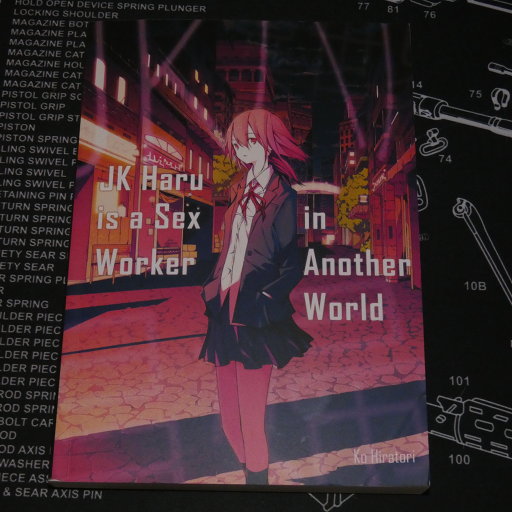
Despite being a light novel, JK Haru is not illustrated.
JK Haru wa Isekai de Shoufu ni Natta (JK Haru Is a Sex Worker in Another World) gained some notoriety last year when a licensed version became digitally available. Hard copies are now in print as well. Being an isekai light novel, the book is somewhat tongue-in-cheek despite the subject matter. However, I believe the tone it adopts appropriately approximates the sort of setup readers might expect in an isekai light novel about prostitution, thereby facilitating its ability to get them interested in the story before confronting them with the uncomfortable realities that correspond with sex work in general and the vulnerability of prostitutes specifically.
That said, JK Haru Is a Sex Worker in Another World is not a grim book, despite a number of unsettling scenes and events. Moreover, the misogyny and violence encountered in the fantasy world setting are not exactly out of line with the sorts of hazards women face in many sectors of our real world. It's a difficult balancing act for the text, contrasting amusing adventures with these threats. And while there is plenty of sex in JK Haru—as you might expect—the scenes are typically presented matter-of-factly and not written to titilate. Sex work in JK Haru is not glamorous, and the book keeps the attention on the work part, not the sex part.
Notably, I never felt as if JK Haru Is a Sex Worker in Another World was deliberately prurient the way that, frankly, so many light novels seems justifiably accused of being. I've seen enough comments on the Twitter to know many readers will disagree with me on this point, but I think this may have to do with one's initial expectations of the book and what sort of demands are placed on it. JK Haru is presented from Haru's first-person point of view, which I think makes it more effective at conveying the bleakness of her world and the impact of the events around her. Likewise, it also better communicates the joy she finds when she pursues various recreational diversions or actually has sex she enjoys. It also avoids presenting the violence in her world or the sadism she encounters as elements the reader is expected to like (unlike the corresponding scenes in some other light novels I might name). There are surely readers who do prefer that sort of content and wish JK Haru had more of it, but I'm inclined to regard that as an indictment against those readers themselves and not the text for obstensibly failing to omit it.
Incidentally, the various twists and reveals in JK Haru Is a Sex Worker in Another World are good enough that I recommend a spoiler-avoidance posture if you expect to read it.
Posted in Books, JK Haru Is a Sex Worker in Another World, RECOMMENDATIONS | Tags: Bad Things Happen to Good People, books, Built for Sin, Economics, Fan Service, Light Novels, May-December Romances, Rape, Sex | Permanent Link
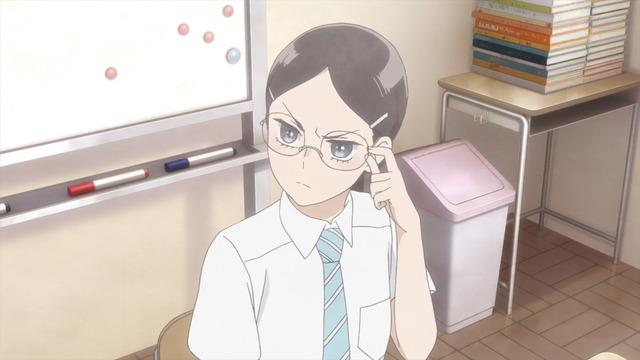
Rika could stand to be a little less uptight.
Actually, wait, the title of this post is a lie. Probably everybody did. I, for one, am in it for the potential wall-to-wall traumarama. Somehow, Araburu Kisetsu no Otomedomo yo. (O Maidens in Your Savage Season) is my top Summer 2019 show through four episodes, even though I typically hate a lot of Okada Mari's work. Anohana is the best example of this, being a highly praised show about Deep Feelings which drove me nuts with its bullshit and lazy contrivances. On the other hand, I'm riveted in my front-row seat for Araoto as its melodrama plays out. So far, its themes of unrequited love, envy, lust, and cruelty are not especially unique, but they also don't have to be. Everything just works and I'm happy to see its characters struggle to make sense of this challenging stage in their lives.
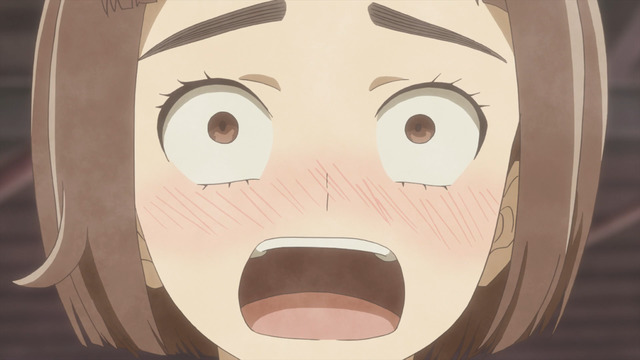
We're going to be seeing this face a lot, I suspect.
With regard to my own feelings about the Okada-isms in Araburu Kisetsu no Otomedomo yo., it's not as if there haven't been shows I've liked despite of (or potentially because of) her contributions to them. Additionally, it's entirely unclear to me whether my opinions on Okada-type works are simply unreliable, whether the shows I end up liking were fixed by other collaborators, or whether it turns out I actually do like her work, but it's other people in the production cycle who fuck it up along the way. Seeing as how the Araoto anime is based on a manga that Okada Mari is authoring herself, there's a genuine possibility that "Pure Okada" is legitimately good, and sour products such as Anohana result from other cooks dumping shit into her broth. Or I suppose maybe I'm just finding her more palatable over the years.
Posted in Araburu Kisetsu no Otomedomo yo。, GIRL NEXT DOOR | Tags: 16-year-old love interests, Bend Her Over a Kotatsu, GIRL NEXT DOOR, Haruka Tomatsu, Love Confessions, Manga, May-December Romances, Plying Girls, Romance, Season Introduction, Sex, Summer 2019, tsundere, Unrequited Love | Permanent Link
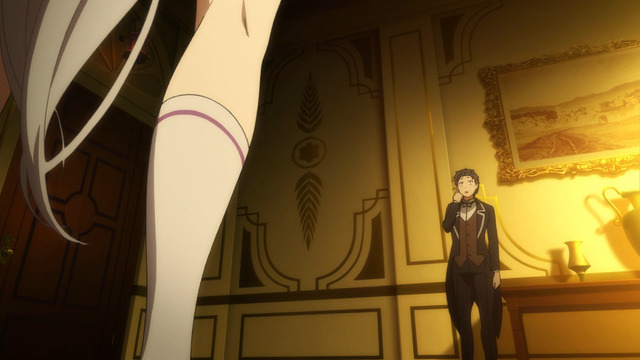
This is some compositing.
I tried watching Re:Zero kara Hajimeru Isekai Seikatsu (Re:ZERO -Starting Life in Another World-) when it aired during the Spring 2016 anime season. I made it five episodes before dropping it because I found the show rather irritating. Fast forward to the Spring 2019 anime season, and somehow Isekai Quartet finished at the top of my rankings, edging out Kono Oto Tomare! I did, in fact, expect this to happen. (The watching part, not the ranking part, that is.) I've made it through the first cours of Re:Zero so far, and do have to admit it improves quite a bit after the initial episodes.
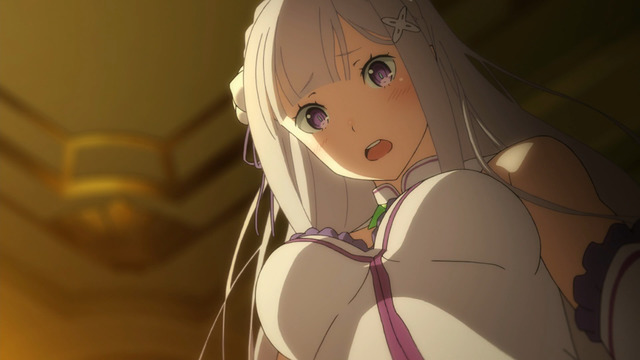
Partial eclipse.
I'm a little surprised how few spoilers I knew, and how many I had forgotten. That probably helped, by preserving the sense of mystery that pervades the second half of the first cours. I do 100-percent still remember the Rem and Emilia spoiler which is still to come, though. However, since I don't actually 'ship any of the characters, knowing this probably isn't going to matter much one way or another. In any case, my renewed curiosity in Re:Zero is probably a testament to the success of Isekai Quartet as a marketing ploy. Seeing as how Isekai Quartet is getting a second season, with the promise of unspecified newcomers, I suppose it's possible the premise will expand to include more than just four Kadokawa-affiliated isekai properties, although then maybe they'll need to call the sequel something like Isekai Octet or whatever. I think I'd be okay with that.
Posted in Isekai Quartet, Re:Zero kara Hajimeru Isekai Seikatsu | Tags: Bad Things Happen to Good People, Crossovers, DARK MAMIKO, Dropped Shows, Fan Service, Light Novels, Love Confessions, Love Triangle, Mamikore, May-December Romances, Poor Little Rich Girls, SD, Season Conclusion, Spoilers, Spring 2016, Spring 2019, Summer 2016, Unrequited Love | Permanent Link
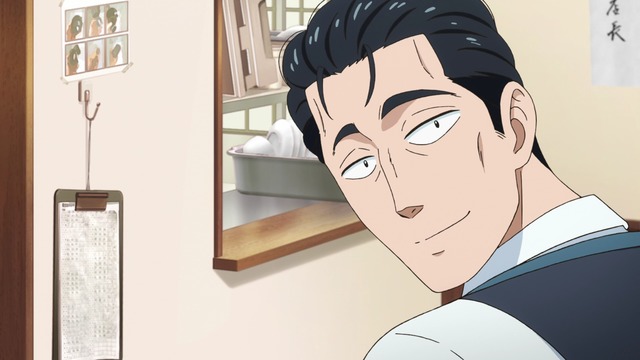
Masami does not come across quite as lame in the anime as he does in the manga.
Right up front, you should know Koi wa Ameagari no You ni (Love Is Like After the Rain) is about a teenage girl who falls in love with her 45-year-old manager at the family restaurant where she works part-time. Nevertheless, it is not as—as the kids say—"problematic" as you might think, maybe because it is seinen instead of shoujo. (This last part is not a joke. If you've read a lot of shoujo, you know the genre revels in "problematic" developments.) Assuming the anime basically follows the manga, I think we can expect something much closer to Sweetness and Lightning than, uh...actually, I can't think of a show off the top of my head that follows through with this sort of pairing. (This assumes Tsumugi and her teacher did not started tearing each other's clothes off at some point in the Amaama to Inazuma manga.)
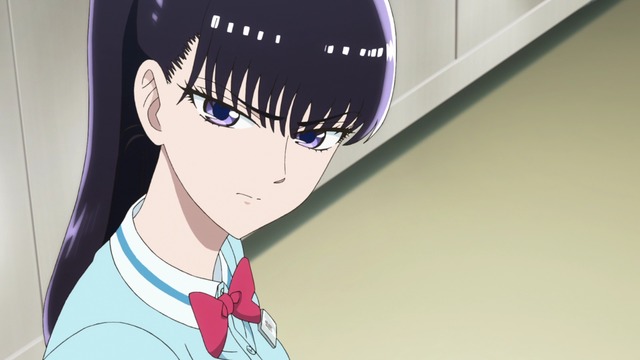
There is a lot of glaring in this show.
Rather, Koi wa Ameagari no You ni offers beautiful animation (assuming you're fine with the elongated character designs) with solid WIT STUDIO production values and the potential for the noitaminA block to potentially mean something again. That is, you don't necessarily need to dodge the show if the premise makes you uncomfortable. (Likewise, if you find the premise titillating, expect to be disappointed.) In a season chock full of so many good shows already, I can't claim After the Rain qualifies as a "must see" by any means, but it is at least worthy of more consideration by potential viewers who may have prematurely dismissed it based on preconceptions.
Posted in Koi wa Ameagari no You ni | Tags: Legs that go up to her neck, May-December Romances, noitaminA, Romance, Running, Season Introduction, Shoujo, Spoilers, Unrequited Love, Winter 2018 | Permanent Link
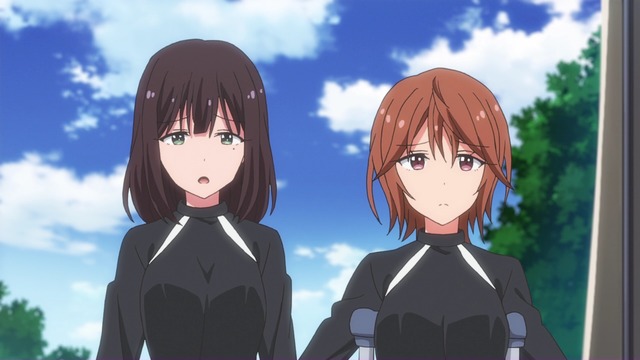
Yuri > Megumi.
I was expecting Two Car to devote episodes to all of the various racing teams which it had introduced at the start of the series. In fact, while it did do this for a few of the groups (including the announcers), the show instead concluded by focusing on the lead pair. Specifically, it focused on the lead pair and their would-be love triangle rivalry over their coach. After the show's only male (and faceless, to boot) character skipped town at the end of the first episode, I thought for sure Two Car would simply finish with some vague promise of pursuing him to the Isle of Man where they would TT battle for his heart. But, in fact, he returned so Megumi and Yuri could compete for his affection once again. (At least he has a face now.)
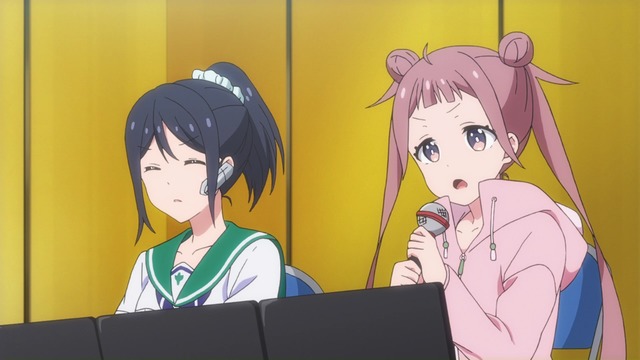
The episode about these two was pretty good.
Based on the reactions I've encountered, it seems Two Car is somewhat niche in its appeal. I found this a little surprising, but possibly that simply means I'm part of that niche. In any case, I enjoyed Two Car quite a bit for what it is and its GIRLS und PANZER approach to ignoring the genuine hazards of its rather dangerous activity. I was also not put off by the romantic subplot involving the coach. It's obvious Megumi's and Yuri's feelings will never reach him, and none of the other characters have the slightest interest in him. In that respect, it's a lot less objectionable than, say, a harem comedy where Potato-kun obliviously stiff-arms overly eager girls by the helmet as they inexplicably pursue him for no Goddamn reason. In Two Car, he's mostly just an excuse for Megumi and Yuri to continue bitching each other out. I know this aspect of the show also aggravated the Bejesus out of some viewers, but I'm rather a fan of otherwise likable girls being horrible to each other for my amusement.
Posted in Two Car | Tags: Autumn 2017, May-December Romances, Romance, Season Conclusion, Tiv, Unrequited Love | Permanent Link
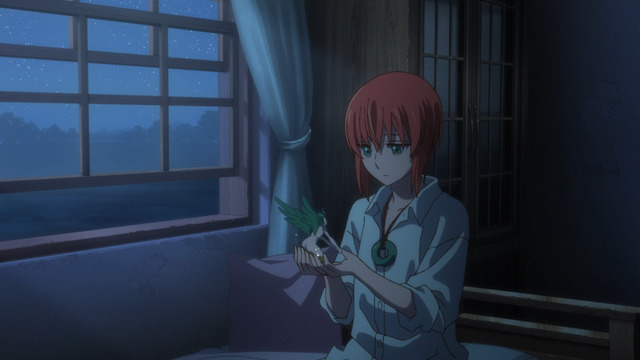
Arguably worse than mosquitoes.
The long-awaited anime adaptation of Mahō Tsukai no Yome (The Ancient Magus' Bride) is really here. Based on the first episode, Wit Studio is faithfully reproducing the look and feel of the magic realm (well, England, actually) where 15-year-old Chise finds herself. Although it's probably unrealistic to expect the standard set in the three prequel OVAs and the first episode to persist throughout the next two cours, I'm fairly confident Wit will be able to do the series justice. It's a gorgeous manga, so expectations for the anime are quite high. No pressure.
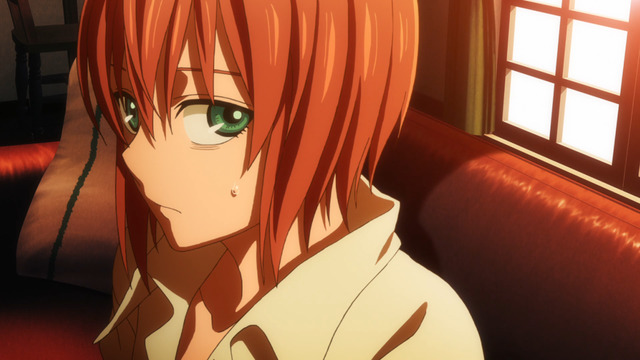
It's been a long day.
Despite the title, Mahoutsukai no Yome isn't really about a child bride, although the opening minutes of the anime (and the opening pages of the manga) are meant to invoke some troubling impressions. There are dark undercurrents in the series, but they're offset for the most part by the magic and splendor of the story and setting. I'm seven volumes deep into the English-language releases by Seven Seas Entertainment, so I've got a general idea where the anime is going to go. I'm still a bit uncertain how to promote it, since this isn't a title that relies on tremendous highs or emotional whirlwinds to keep readers interested. I suspect some of the complaints I saw about the OVAs' pacing will apply to the TV series as well, at least among some viewers. I'm by no means suggesting The Ancient Magus' Bride is for everyone, but it definitely deserves investigating for at least an episode or two. At a minimum, it's a stark rebuttal to the typical complaints people have about "anime these days."
Posted in Mahō Tsukai no Yome, Manga, RECOMMENDATIONS | Tags: 16-year-old love interests, Autumn 2017, Manga, May-December Romances, Romance, Season Introduction, Spoilers | Permanent Link
|
|










